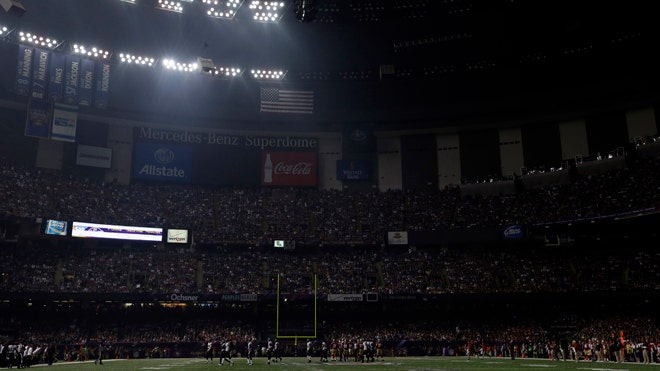Something Justin Tuck of the New York Giants
said on Thursday on SportsCenter rang true to my ear:
“I like the Ravens for one simple fact -- they remind me of us. They seem to be the team of destiny. I truly believe the 49ers are a better team on paper. But this is a game where so many emotions have come into this game. I think the Ravens are riding high with the whole playing for Ray (Lewis). All types of stuff that momentum is going to come into effect on Sunday. I think I am going with the Ravens just because of that."
A number of things cause me to think the 2012 Ravens are a lot like the 2011 Giants. Neither one, for starters, had a great regular season. The Giants were just 9-7; the Ravens 10-6.
Both teams had good stretches: the Giants won 6 of 7 after losing their first game; the Ravens won 8 of 9 after starting 1-1. And both teams had bad stretches: the Giants lost 5 out of 6 games from mid-November to mid-December in 2011; the Ravens lost 4 out of 5 games in December, 2012.
Arguably, the reason neither was consistently good in the regular season was due to key injuries, where older veteran leaders on defense were out for some games. It was in those stretches the Giants in 2011 and the Ravens in 2012 lost. When they had all their players, these clubs were excellent.
Both the Giants and Ravens had to win three playoff games to get to the Super Bowl. Each of them started by winning one at home and then they won two on the road.
The Giants were led by quarterback Eli Manning, whose regular season career passer rating (82.7) is good, but not great. The Ravens are led by quarterback Joe Flacco, whose regular season career passer rating (86.3) is good, but not great. Since 2005, 23 NFL quarterbacks who attempted at least 2,000 passes have a passer rating of 75.0 or higher. Flacco ranks 14th; Manning 16th. Neither is anywhere near the best: Aaron Rodgers, 104.9 and Tom Brady, 101.3.
In the two seasons Eli Manning led the Giants to the Super Bowl and the one Joe Flacco has done the same for the Ravens, each was his best. Manning's post-season passer rating for the Giants championship runs in 2007 and 2011 was 100.1, 17.4 better than his career number. Flacco's post-season passer rating for the Ravens championship run, this year, is 114.7 so far, 28.4 better than his career number.
THE 49ERS ARE BETTER ON PAPER
As Justin Tuck said, San Francisco appears to be the better team in 2012 on paper. The 49ers outscored their opponents by 124 points; the Ravens bettered theirs by just 54. The two teams scored almost the same number of points: 398 for Baltimore; 397 for San Francisco. The difference was that the 49ers gave up only 273 points in 16 games; the Ravens allowed 344.
The 49ers had a much better running game. San Francisco gained 2,491 yards on the ground; Baltimore 1,901. The Ravens passed for 441 more yards. But after Colin Kaepernick replaced Alex Smith at quarterback, the passing numbers for the two teams were nearly identical.
Baltimore's defense, now, however, is better than it was when Ray Lewis was out. Lewis has been a tackling machine in the post-season. And while Terrell Suggs is still not 100%, the Ravens missed him part of the season and that hurt their defense, as well.
A huge factor for San Francisco's defense will be their pass rush. When Justin Smith was out, teams doubled-up on Aldon Smith and the 49ers could not pressure opposing quarterbacks. That exposed their defensive backs, who had to cover for much longer. My expectation is that, while Justin Smith is still ailing, their line will be able to rush Flacco, and that will give their backs a chance to cover the Ravens receivers.
THE FIVE KEY FACTORS
There are five factors to judge a team by: offense; defense; special teams; coaching; and intangibles. When comparing the two clubs, each factor is worth zero or more points to one and the inverse to the other.
Offense: Because of his experience and quality and quantity of his receivers, Joe Flacco is likely to pass for more yards than Colin Kaepernick. Conversely, between Frank Gore and Kaepernick, the 49ers look to have a big edge in the running game over Ray Rice and the Ravens. Additionally, the 49ers scheme is run-oriented. Offensive value--San Francisco +3.
Defense: Both teams are strong on the defensive line. The 49ers are just a bit stronger. Both have excellent linebackers, but the 49ers are better. Their defensive backs are roughly equal as groups, but because Ed Reed is a great playmaker, the Ravens have an edge. Offensive value--San Francisco +2.
Special Teams: Justin Tucker was perfect all season on extra points and 30 of 33 on field goals, including 4 of 4 for 50+ yards; the 49ers weakness this year has been David Akers, who missed 7 field goals and was only 2 for 6 from 50+. Special Teams value--Baltimore +3.
Coaching: John Harbaugh has more experience. Jim Harbaugh has more intensity. The Ravens were forced to change offensive coordinators mid-stream. The 49ers offensive play-calling has been questionable at times. Coaching value--Even.
Intangibles: The first which works for the Ravens is the Ray Lewis factor. He is their clear leader. He inspires them. This will be Lewis's last game. They want to send him out on top. And the other is what Justin Tuck said: this Ravens team is very much like last year's Giants team. It might not be great on paper. But when it counts, they will come up big. Intangible value--Baltimore +5.
Added together, the Ravens win by 3 points. The big difference will be the intangibles.
My pick: Baltimore 24, San Francisco 21.







